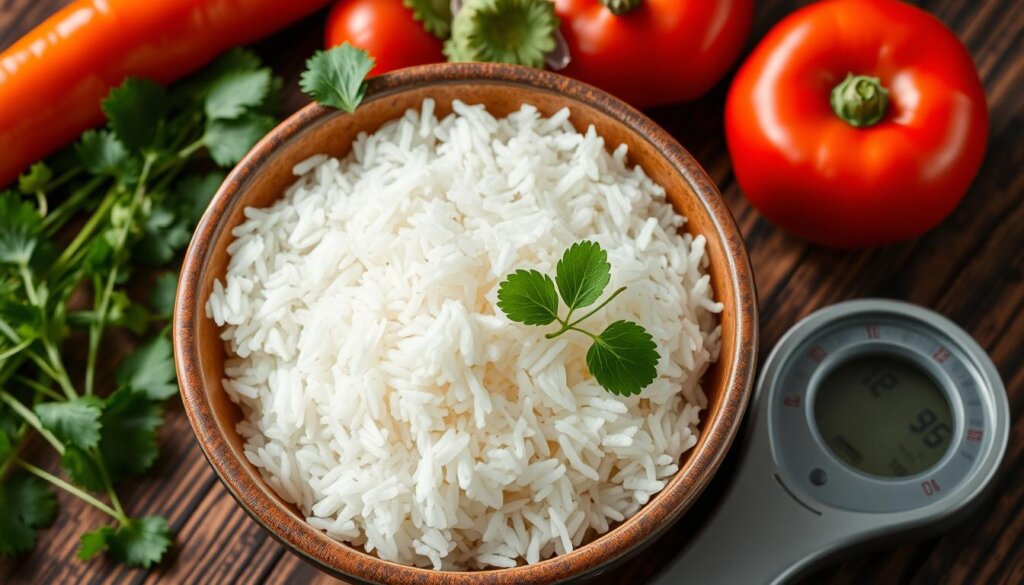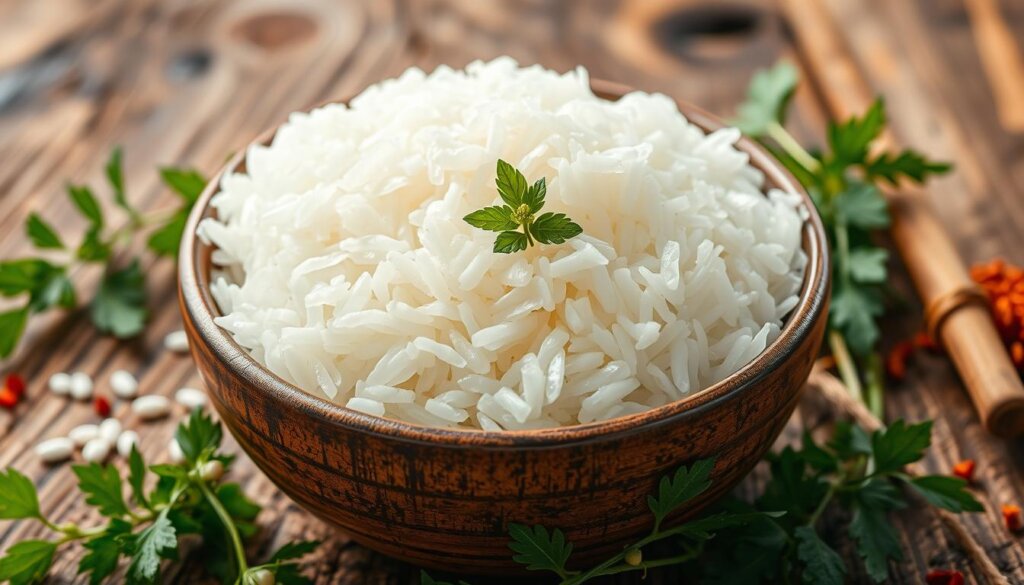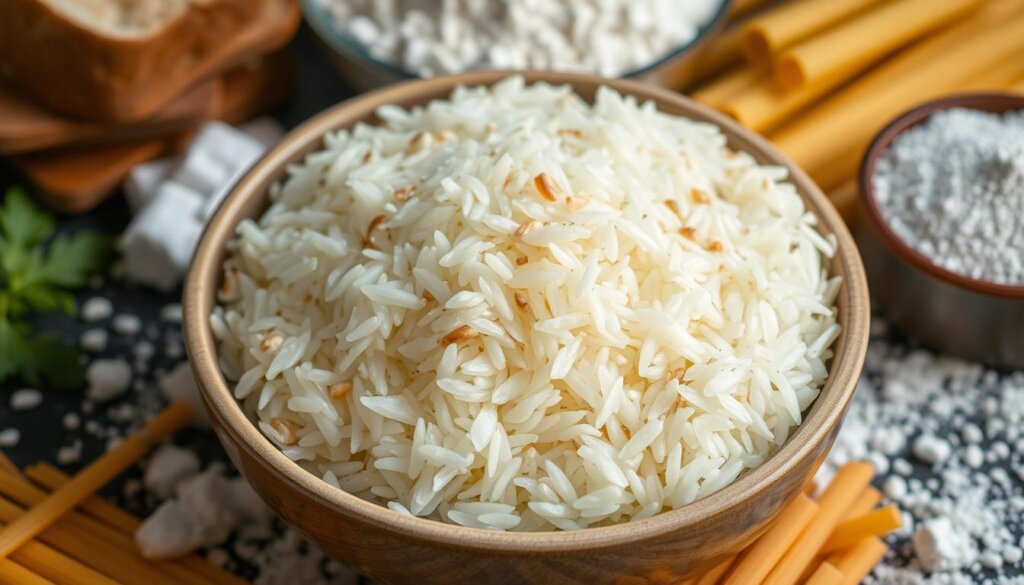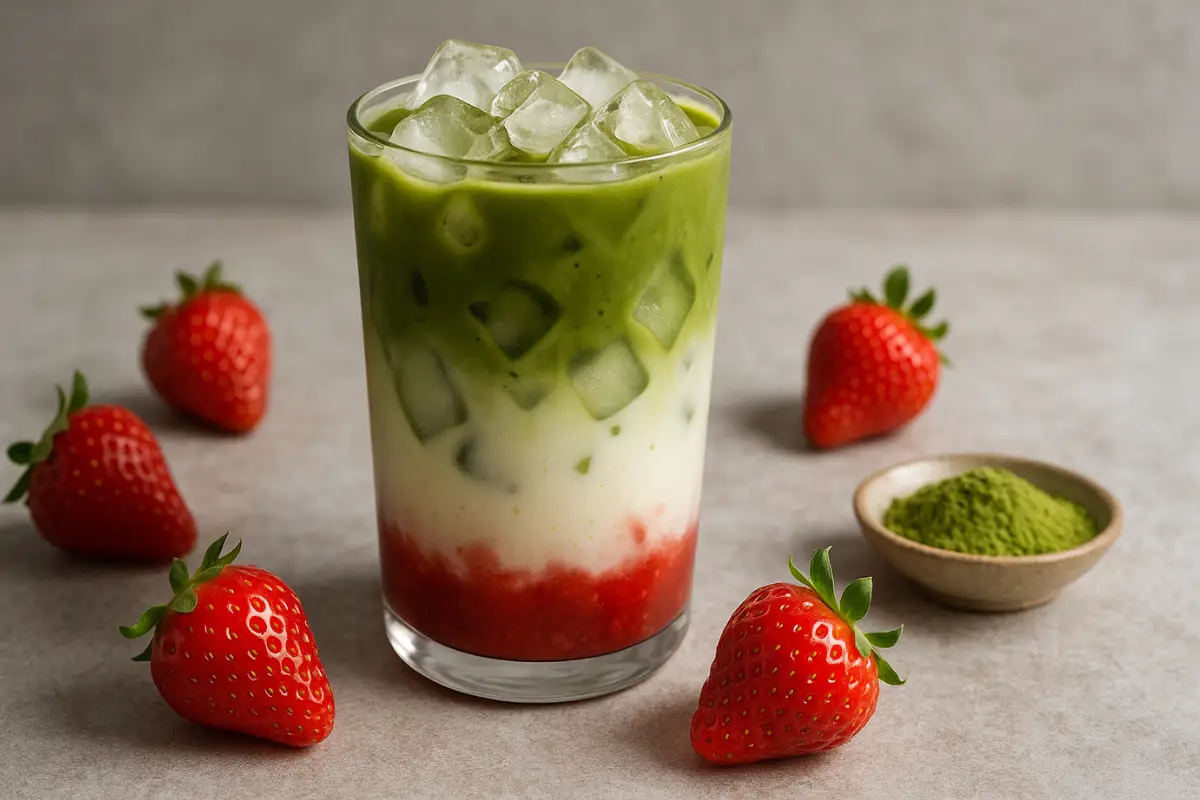Ever wondered if jasmine rice is okay for your gluten-free diet? Rice is a staple food in over 100 countries and incredibly versatile.
But for those with celiac disease or other dietary needs, the question arises: does it contain gluten? Discover the truth about gluten-free rice varieties and learn how jasmine rice fits into your diet.
For a deeper dive into rice-related options, explore gluten-free rice pilaf facts or the best gluten-free bread alternatives. This guide will clarify your options and make choosing the right rice easier!
Table of contents
Understanding Jasmine Rice
Jasmine rice comes from Southeast Asia, mainly Thailand. It has a floral smell and is slightly sticky when cooked. This makes it a top choice in Asian dishes.
What is Jasmine Rice?
Jasmine rice is a staple that adds flavor to dishes. It has a unique taste and smell. Its shiny look and fluffy texture make it special for rice fans.
Nutritional Benefits of Jasmine Rice
Jasmine rice is full of carbs, which gives us energy. White and brown jasmine rice have different nutrition levels. Brown rice has more fiber, vitamins, and minerals.
Varieties of Jasmine Rice
There are white and brown jasmine rice types. White rice is more common, while brown rice is less processed. Brown rice is healthier because it keeps more nutrients.
| Variety | Texture | Nutritional Content | Culinary Uses |
|---|---|---|---|
| White Jasmine Rice | Slightly sticky | Lower in fiber | Common in stir-fries and curries |
| Brown Jasmine Rice | Chewy and nutty | Higher in fiber and nutrients | Great for salads and grain bowls |

Gluten-Free Status of Jasmine Rice
It’s important to know if jasmine rice is glutenless. This is key for people with gluten sensitivities or celiac disease. Jasmine rice is naturally without gluten, making it a safe option for meals.
But, it’s vital to make sure the rice hasn’t been mixed with gluten during processing.
Is Jasmine Rice Naturally Gluten-Free?
Yes, jasmine rice doesn’t have gluten. This makes it a good choice for those who need to avoid gluten. But, it’s important to watch out for cross-contamination.
Most rice is gluten-free, but some might get gluten in processing. Look for certified gluten-free labels to be sure. About 30% of rice brands have these labels.
Comparison with Other Rice Varieties
Other rice types like basmati, brown, white, and wild rice are also gluten-free. Here’s a table showing the gluten content of different rice types:
| Rice Variety | Gluten Content |
|---|---|
| Jasmine Rice | Gluten-Free |
| Basmati Rice | Gluten-Free |
| Brown Rice | Gluten-Free |
| White Rice | Gluten-Free |
| Wild Rice | Gluten-Free |
Rice, including jasmine, is a great glutenless choice. It’s full of B vitamins and antioxidants. It also has fiber, which helps with blood sugar and heart health.
For those looking for more gluten-free options, try quinoa, millet, and lentils. These choices show that a gluten-free diet can be full of flavor and variety.
Is Jasmine Rice Gluten-Free? Find Out Now.
Jasmine rice is a favorite for many, thanks to its glutenless nature. It’s aromatic and fragrant, fitting well into many diets. In 2018-2019, people around the world ate about 490.27 million metric tons of rice.
A small serving of 1/4 cup (45g) of jasmine rice has 160 calories. It has no cholesterol or sodium. This makes it a good choice for those who can’t eat gluten.

More and more people have celiac disease or gluten sensitivity. This affects about three million Americans. Jasmine rice is a tasty, gluten-free option for many recipes.
Always choose certified gluten-free brands to stay safe. This way, you can enjoy jasmine rice without worry. It adds variety to your meals while keeping your health in mind.
Eating mindfully and knowing how to cook safely makes meals better. Try adding gluten-free foods like jasmine rice to your meals. With care, you can enjoy this tasty rice in your diet.
Cross-Contamination Concerns
It’s important to know about cross-contamination risks with rice for those with gluten sensitivity. Jasmine rice is naturally gluten-free. But, it can get contaminated during processing, storage, or sale. Knowing how this happens helps you prevent it.
How Cross-Contamination Occurs
Cross-contamination happens when jasmine rice is made in places that also handle gluten. This can put gluten in the rice. Also, shared scoops in grocery stores can spread gluten into the rice.
Precautions to Avoid Gluten Contamination
To avoid gluten contamination, follow these steps:
- Choose pre-packaged rice from trusted brands that say it’s gluten-free.
- Cook jasmine rice alone from gluten foods to avoid mixing.
- Don’t buy rice from bulk bins to avoid contamination.
- Find rice products with gluten-free certification to be sure they’re safe.
Being careful and aware can help those with gluten sensitivity enjoy jasmine rice safely.

Choosing the Right Jasmine Rice Brand
When you buy jasmine rice, picking the best brand is key. Many gluten-free rice brands are out there. Choosing wisely means your dishes will taste great and be consistent.
Top Gluten-Free Jasmine Rice Brands
Some brands are known for their quality and gluten-free options. Here are a few:
- Lundberg Family Farms: They have many gluten-free jasmine rice products.
- Lotus Foods: They offer organic and unique jasmine rice.
- Thai Kitchen: They make jasmine rice easy to find and use.
- Mahatma: They have aromatic Thai jasmine white rice that’s gluten-free.
- Tilda: They have gluten-free basmati and flavored rice mixes.
- Royal: They offer high-quality grains with real flavors.
Choosing these brands means your rice will cook well. It won’t clump or get mushy, which is important for great results.
What to Look for When Buying Jasmine Rice
When you’re looking, keep these tips in mind:
- Look for gluten-free certifications on the packaging.
- Don’t buy rice from bulk bins to avoid contamination.
- Check the smell, grain length, and texture for the best results.
- For soft rice, try Golden Phoenix’s Hom Mali certified rice.
- Ask the maker about gluten processing if you’re worried.
Using the right jasmine rice in your tea cooking or meals will make them taste better.
Conclusion
Jasmine rice is a tasty and safe pick for those following a gluten-free diet. It’s naturally gluten-free, like basmati and wild rice. This makes it great for people with celiac disease or gluten intolerance.
Make sure to choose brands that are certified gluten-free. Also, watch out for cross-contamination to enjoy jasmine rice safely.
Jasmine rice is great for many dishes, from vegetable fried rice to jasmine rice soup. You can find many brands and types to try. This lets you get creative in the kitchen while sticking to your diet.
In short, jasmine rice makes your glutenless diet better and more fun. It helps you make healthy and tasty food choices. So, enjoy the special taste of jasmine rice and keep your diet healthy and glutenless.
FAQ
Is jasmine rice gluten-free?
Yes, jasmine rice is naturally without gluten. This makes it safe for people with gluten sensitivity or celiac disease.
What are the nutritional benefits of jasmine rice?
Jasmine rice is full of carbohydrates, giving you energy. Whole grain varieties also have fiber, vitamins, and minerals.
How can I avoid cross-contamination when using jasmine rice?
To avoid cross-contamination, choose pre-packaged jasmine rice from trusted brands. Make sure it’s labeled as gluten-free. Don’t use bulk bins. Always cook rice alone from gluten foods.
What should I look for when buying jasmine rice?
Look for gluten-free certifications on the packaging. Also, contact manufacturers to learn about their gluten processing.
What are some reputable brands of gluten-free jasmine rice?
Trusted brands include Lundberg Family Farms, Lotus Foods, and Thai Kitchen. Also, Mahatma, Tilda, and Royal offer certified gluten-free jasmine rice.
Can jasmine rice be part of a gluten-free diet?
Absolutely! Jasmine rice is tasty and easy to add to a gluten-free diet. Just remember to take the right precautions.
What rice isn’t gluten-free?
All natural rice varieties, including white, brown, jasmine, and basmati, are gluten-free. However, flavored or pre-packaged rice dishes may contain gluten due to additives or seasonings. Always check labels.
Is jasmine rice healthier than white rice?
Jasmine rice is nutritionally similar to regular white rice but has a lower glycemic index when consumed as whole grain (brown jasmine rice), making it a slightly better option for sustained energy.
Can celiacs eat rice?
Yes, celiacs can safely eat natural rice as it is gluten-free. However, ensure there is no cross-contamination during processing or preparation.





